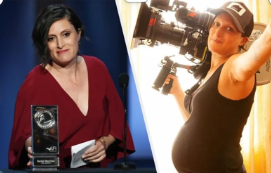making THE CASE FOR CARE:
REEL FAMILIES FOR CHANGE with support from THE MOM PROJECT PRESENTS
THE SCREENWORKERS’ FAMILY CARE GRANT
Written by Sarah Lutot
Reel Families for Change (RFC) is a nonprofit think tank that dares to imagine a future of filmmaking that is inclusive, diverse, and fair. We envision a sector where screen industry professionals no longer have to fight for basic human rights or surmount debilitating social hurdles in order to thrive in their chosen field. To that end, RFC has created a series of mutual aid programs and offerings to address, resolve, and – eventually – eradicate these very prohibitors. The first, and perhaps most well-known, is our Screenworker Family Care Grant.
While the grant is currently funded by a league of aligned sponsors and strategic partners, it was The Mom Project – founded by Allison Robinson (mom of three), while on her first maternity leave – and its nonprofit branch MomProject.org, that were the grant’s earliest benefactors. Together, the organizations sowed the first seed of $15,000 to actualize RFC’s dream of supporting the underserved, overburdened, marginalized and silenced mothers working in film and television.
RFC’s Family Care Grant offers screen industry workers need-based support to offset the debilitative expenses associated with familial care. In 2020, at the height of the pandemic, The U.S. Bureau of Labor Statistics determined child care costs to be the number one prohibitor for retention within and re-entry into the workforce. While many forget that this includes the screen industry, our peers were, and are, no exception.

Care costs often force filmmakers with families away from the industry. Finding affordable, reliable, and trustworthy childcare, day programs, and/or medical coverage, things that have always been difficult, have only become more burdensome in the past few years. Choosing between making a living doing something you love and making a life with the ones you love isn’t a choice anyone should ever have to make.
According to the Department of Health and Human Services, childcare costs an average of $11,000 per year, per child, with the average family in the U.S. spending 10-15% of their income on childcare. To afford exorbitant costs, many families need at least a dual income, circling back to the need for childcare in the first place.
There is a cultural expectation that one parental figure (most often expected to be a mother) should not work and should be a full-time caretaker to children. This leaves the responsibility of making a living wage to support a family to another parental figure (most often expected to be a father), which is often not possible and is not representative of any familial structure besides the heteronormative nuclear family. This grant is designed to keep parents and caregivers from having to make the inexplicable sacrifice of leaving their filmmaking career behind.
Navigating modified school and daycare schedules amidst the COVID-19 pandemic while working full-time became an impossible feat – another consequence of the childcare crisis forcing caregivers to give up their filmmaking passion. The New York Times reported that in September 2020, there were 1.6 million mothers forced from the labor force due to school closures. In the long-term, this not only decreases the family’s income trajectory significantly, but also diminishes the livelihood of an artist forced to retire.
Aid from the government to counter this crisis has not accounted for the devastation of giving up a creative career as many filmmakers with families have been left with no other option. Non-parental caregivers who are not supported by governmental grants and legal protections are left in an even more difficult position as they are not recognized at the same standard as birth and adoptive parents.
Medical expenses are another steep hurdle that families are subjected to climb. The average vaginal hospital birth in the U.S. costs over $13,000 without insurance, and the average cesarean section birth costs close to $23,000 without insurance. Many families rely on insurance through a full-time job.
Without adequate childcare, a full-time job is not an option, leaving caretakers uninsured, unable to pay medical bills, and often unemployed. Having all three – a full-time job as a screen-worker, good health insurance, and affordable childcare – should not be an unattainable luxury. Creative arts workers in the film industry deserve to fuel their passions for their jobs and their families without these extreme financial burdens.

RFC, with the help of The Mom Project and MomProject.org, joined the fight against workforce displacement for parents and caregivers in the screen industry. Any narrative-focused screen professional currently working on a narrative project or promised to return within 90 days who is able to demonstrate parent, guardian, or caregiver status is eligible for the Family Care Grant. To learn more, visit our Grant Information Page.
For press related inquiries about the grant, email press@reelfamilies.org. For all other questions contact our Grants Support Team at grants@reelfamilies.org.
mutual aid and sustainability efforts?
Sign up to attend our next Open House.





